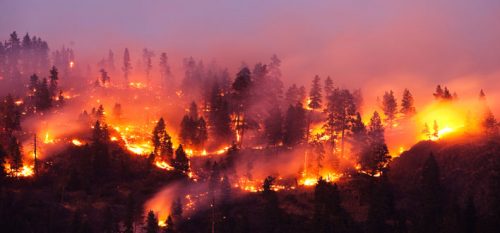Moonlight Wildfire Litigation
On Labor Day, September 3, 2007, a wildland fire broke out on private property in Plumas County. Dubbed the “Moonlight Fire” because of its proximity to Moonlight Peak, it ultimately burned 65,000 acres, including 45,000 acres of federal forest land.
On September 4, 2007, while the Moonlight Fire was still burning, the California Department of Forestry and Fire Protection (“Cal Fire”) and the United States Forest Service (“USFS”) launched a joint investigation into the origin and cause of the Moonlight Fire. One day later, on September 5, 2007, the government investigators claimed that a bulldozer owned by Eunice Howell’s Forest Harvesting Company (“Howell”) struck a rock and caused the fire. Sierra Pacific Industries (“Sierra Pacific”) had hired Howell to fell trees on property owned by members of the Walker family and managed by W.M. Beaty and Associates (“W.M. Beaty”).
In June 2009, the USFS and Cal Fire announced their joint findings in an “Origin and Cause Investigation Report” on the Moonlight Fire (“Official Report”). Two months later, the United States and Cal Fire each filed lawsuits against Howell, Sierra Pacific, W.M. Beaty and the Walker family landowners, claiming that these entities and individuals were jointly and severally liable for the Moonlight Fire. Various private parties subsequently filed five additional lawsuits against the same Defendants. Sierra Pacific hired Downey Brand to represent its interests in the federal suit filed by the United States, as well as in the state court suits filed by Cal Fire and the private plaintiffs. Collectively, these cases sought well over $1 billion in damages, costs and fees.
Discovery continued for several years, involving thousands of documents, hundreds of photographs and videos, and hundreds of witnesses. In July 2012, Defendants settled the federal action with the United States for $55 million in cash and Sierra Pacific’s agreement to convey 22,500 acres of land to the United States.
Thereafter, the state actions continued, with Downey Brand leading the effort to uncover what actually happened the day of the fire and during the subsequent origin and cause investigation. As alleged in numerous pleadings and reported in a variety of subsequent press stories, Downey Brand exposed the government’s focused effort to pin the blame for this fire on these Defendants by falsifying the Official Report, manufacturing and suppressing evidence, tampering with witnesses, and lying under oath. Downey Brand also uncovered an illegal “off-book” account maintained by Cal Fire in violation of state law — a discovery later confirmed by the Office of the State Auditor. Cal Fire used this slush fund to purchase equipment and trips for the benefit of the very investigators charged with conducting wildland fire investigations.
In July 2013, the Honorable Leslie C. Nichols dismissed the state lawsuits following a three-day pre-trial hearing. Judge Nichols found that all of the Plaintiffs had failed to establish a prima facie case against Defendants, and also held that Cal Fire could not state a claim against Sierra Pacific, the Walker family landowners, or W.M. Beaty. Defendants thereafter filed a motion seeking attorney fees, expenses, and sanctions from Cal Fire. In February 2014, Judge Nichols granted this motion in full, finding that Cal Fire had engaged in “pervasive” and “egregious” discovery abuses. The state court imposed terminating and monetary sanctions against Cal Fire, awarding Defendants more than $32 million in fees. In its decision, the state court wrote:
Although it is most distasteful, the Court in discharging its duty finds it necessary, and accordingly, does bring the full weight of authority to bear in issuing terminating sanctions and full compensatory attorney fees and expenses against California Department of Forestry and Fire Protection. The Court finds that Cal Fire’s actions initiating, maintaining, and prosecuting this action, to the present time, is corrupt and tainted. Cal Fire failed to comply with discovery obligations, and its repeated failure was willful. . . . Cal Fire’s conduct reeked of bad faith. . . . Cal Fire. . . destroyed critical evidence, failed to produce documents it should have produced months earlier, and engaged in a systematic campaign of misdirection with the purpose of recovering money from Defendants. . . . The misconduct in this case is so pervasive that it would serve no purpose for the Court to attempt to recite it all here.
Cal Fire appealed the trial court’s July 2013 and February 2014 orders, and Downey Brand filed extensive briefing in support of Judge Nichols’s orders. On December 6, 2017, Downey Brand and its client prevailed on that appeal, when the Court of Appeal issued a published decision affirming judgment in favor of Sierra Pacific and against Cal Fire, and affirming the imposition of terminating sanctions. The court reversed only on the narrow issue of the total amount of monetary sanctions and costs to be awarded in favor of the Defendants. Cal Fire sought review by the California Supreme Court, and on March 14, 2018, the California Supreme Court denied Cal Fire’s request. It also denied Cal Fire’s request that the appellate court’s decision affirming terminating sanctions be depublished. Thus, the merits of Cal Fire’s action have now been fully and finally resolved in favor of Downey Brand’s client Sierra Pacific, and against Cal Fire, except for the amount of money Cal Fire must pay.
To read some of the media coverage associated with the Moonlight Fire litigation, click here.




National Coverage
Local Coverage
Other Coverage
Order Regarding Plaintiff’s Failure to Establish Prima Facie Case
Order Granting Sierra Pacific’s Motion for Fees, Expenses and Monetary and Termination Sanctions
Court of Appeal’s Opinion Filed on December 6, 2017
Court of Appeal’s Order Certifying Opinion for Publication Filed on December 8, 2017





